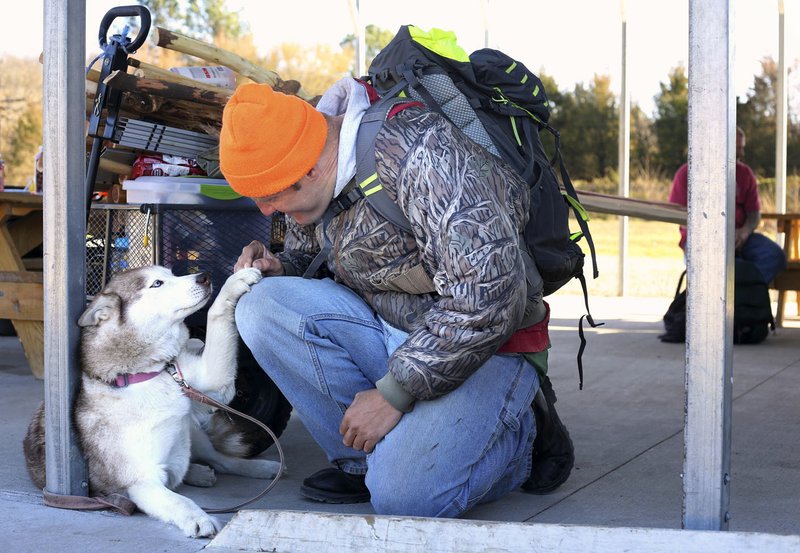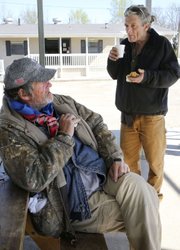FAYETTEVILLE -- One of Northwest Arkansas' primary homeless aid organizations needs greater support from the broader community if it's going to survive and do its job well, the organization's chief executive said last week.
RELATED ARTICLE
http://www.nwaonlin…">Millennials help homeless peers at Fayetteville's 7 Hills
The 7 Hills Homeless Center since 2014 has reached the verge of closing several times until public intervention, including up to $253,000 from Fayetteville this year. The organization has continued to provide showers, food and clothing, case management, housing or other services for more than 2,000 people a year with a budget 40 percent smaller than it was a few years ago, said CEO Billy Rader, who took the post in mid-2015.
7 Hills benefit concert
George’s Majestic Lounge in Fayetteville and Ozark Mountain Records are hosting a fundraiser brunch and concert to benefit 7 Hills Homeless Center.
• Who: The Flying Signs and Arkansas singer and songwriter Some Guy Named Robb
• Where: George’s Majestic Lounge, 519 W. Dickson St.
• When: 1 p.m.-3 p.m. Sunday, May 7
• For more information, call (479) 527-6618 or go to ozarkmountainrecord….
Source: Ozark Mountain Records
"At this point I just feel like we have literally resurrected this organization," Rader said. "It's the greatest comeback that no one will ever see."
Another hurdle less than two months away could again tip the center into severe cutbacks or closure. It owes about $325,000 at the beginning of June for the 2013 purchase of the property on South School Avenue that's now home to its day center. The amount is a balloon payment, which pays off a loan at the end of a certain time instead of chipping away at the loan each month, and is more than one-fifth of the group's annual budget.
The homeless population in Benton and Washington counties, meanwhile, is growing, especially among the youngest and oldest age groups, and is staying homeless longer, according to a decade of research from the University of Arkansas' Community and Family Institute.
Rader and 7 Hills board president Lynn Carver said they're talking with foundations and other potential donors to help cover the debt and they're optimistic the aid will come, though none has made a firm commitment. The issue is bigger than 7 Hills, they added, symbolic of a larger need for predictable, continuous public support for multiple nonprofit groups to truly dig out homelessness by the roots instead of lurching from one emergency to the next.
"What we need is a sustained regional plan to address homelessness all over Northwest Arkansas," said Carver, who also works with the Arkansas Support Network for people with disabilities, Springdale boards and other groups. "I think this community can do it."
'More need than the resources'
The homeless center's financial troubles became apparent in late 2014, when board members asked the Fayetteville Public Facilities Board to give the center $247,000, saying it couldn't stay open long without the infusion. The money came from a 1970s city bond issue that was put into an endowment for the center and was meant to last for years.
Instead, it mostly covered overdue payroll taxes a center employee, who was soon fired, neglected to pay. It also helped with the $400,000 purchase of the 2 acres on School Avenue. The day center moved to the land in January 2016.
"You will always have more need than the resources for them," facilities board member Tommy Deweese warned 7 Hills in 2014.
Rader took over from CEO Jon Woodward, and the center dropped about $400,000 in U.S. Housing and Urban Development housing assistance grants because they required a match; those were then taken on by Fayetteville. The center has an annual budget of about $1.5 million, down about $1 million from when Rader started.
The city stepped in with $103,000 in its 2017 budget to keep 7 Hills' Walker Family Residential Community running for about three dozen residents, then committed up to $150,000 in the first half of this year to keep everything else open.
Throughout those concerns, the center continues to help people such as Clarke Mitchell, a 38-year-old Navy veteran who said he was homeless off and on for about six years, rotating between his car, friends' homes and camping in the woods after relationship and family issues. He got an apartment that costs him about $200 a month about a year ago through the center's veterans program, which helps more than 100 people a year.
Mitchell carves crochet needles and walking sticks and hopes to make a small business out of the work, and he volunteers at 7 Hills, he said late last month.
"I didn't want people to know where I was because I didn't want to ask people for help," he said of his camping days while picking up trash along the Razorback Greenway as a chilly drizzle fell. "I've been doing good since."
Growing pains
More and more people have been in situations like Mitchell's. Almost 3,000 were on the streets, in shelters or doubling up with friends or family during one 24-hour period in January, according to this year's point-in-time regional count organized by Kevin Fitzpatrick, a sociology professor who runs the university's community institute. The survey includes 7 Hills and dozens of other programs, shelters and pantries.
The number has gone up about 250 percent since 2007. Fitzpatrick and other advocates blame the region's growth overall and its mix of good job prospects with a lack of affordable housing.
About half have been school-age children, mostly in Benton County, since the start of the surveys, but the adults have changed in several ways. About 3 percent of survey participants were 55 or older in 2007; now they're almost 29 percent of the group. Conversely, the under-24 crowd has dropped from one in four respondents to about one in 15.
The median length of a particular person's bout of homelessness has more than doubled to 6.5 months in that time as well. Fitzpatrick suspected people are becoming homeless from substance abuse or mental health problems, job or relationship loss and other events quicker than assistance programs can help them.
"There's got to be a backlog, or we'd be solving the problem," he said.
The survey finds more people in Washington County than in Benton, but the balance is shifting slightly, perhaps because more assistance groups are setting up in the northern county, Fitzpatrick said.
The Share the Harvest food pantry at Gravette's Harvest Baptist Church for the past four years has given out a few days of groceries to its clients once a month, volunteer director Terry King said. The pantry once provided food to anyone with a valid ID, but the group this year restricted itself to people from Gravette and four small towns nearby because it would run out of food so often, she said.
"Before that, we would have people who would come from Prairie Grove, from Missouri," she said, adding the pantry still serves anyone who comes but directs more distant residents to pantries nearer to them.
Fitzpatrick, groups such as 7 Hills and the people they serve broadly agree on what must be done: House homeless people quickly, so they can rebuild their lives and avoid jails, emergency rooms and other options more costly for society.
"They see this address, you're not going to get hired," said Alvin Davis, 58, referring to the 7 Hills day center. Davis grew up in Winslow and said he became homeless in 2015 because he worked overseas as an engineer but didn't alert the Internal Revenue Service, racking up thousands in unpaid taxes. He's been in one of 7 Hills's apartments for a few weeks, paying $200 a month.
"You cannot make it on your own, and I've tried," said Davis, adding of other homeless people: "You have to create a stable situation for them to build on."
Doing that will require a network of nonprofit groups, researchers, developers, landlords, tenants, law enforcement, churches and other groups, they have long said -- along with dependable sources of money of the kind that would keep 7 Hills and others running and healthy, Rader said.
A group called the Continuum of Care is working on forming those connections, and its board members include Rader and representatives from The Salvation Army, Community Clinic and Peace at Home domestic violence shelter.
"If they don't prioritize homelessness, they're going to pay for it anyway," Rader said of the region. "We're not going to let this fail. I refuse to let this fail."
NW News on 04/09/2017


